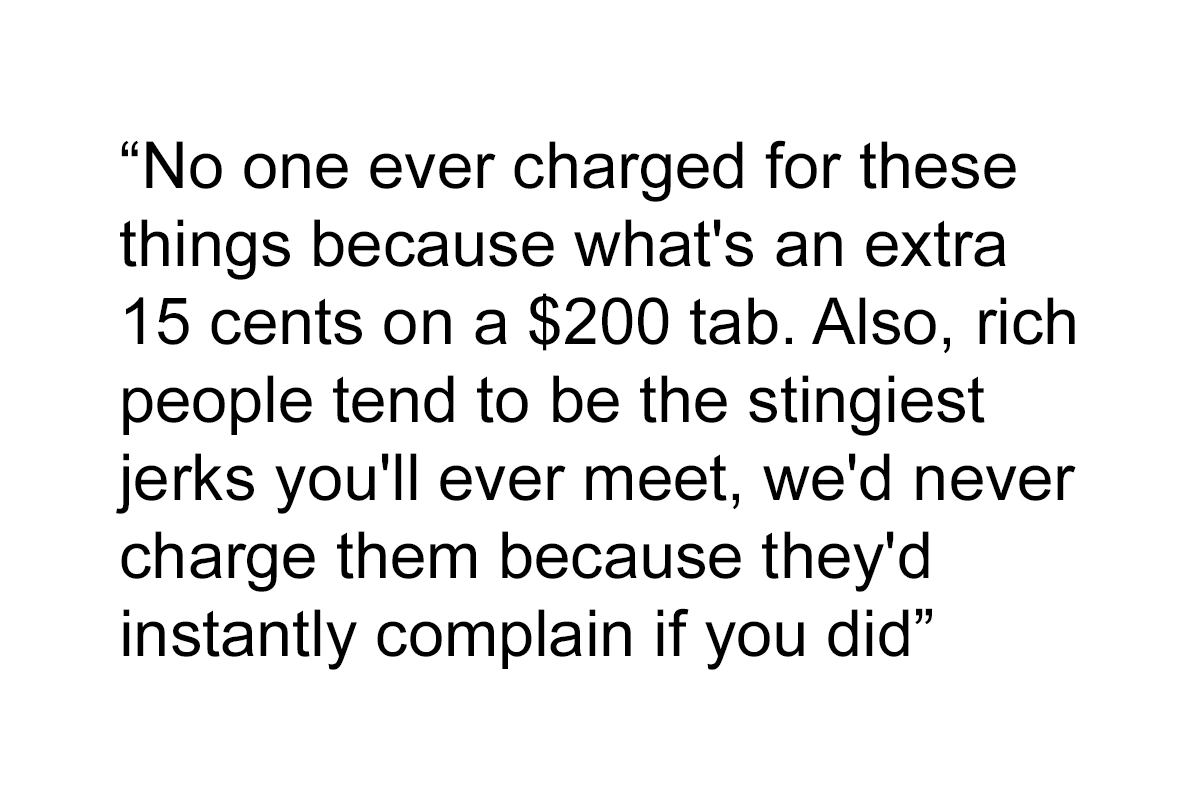
New Manager Makes A Fool Of Himself While Losing The Restaurant Thousands Of Dollars After Employee Maliciously Complies With His Dumb Rule
Reddit user Turkaram had worked as a server at a major restaurant chain for over three years and everything was going smoothly. But one day, a new manager showed up at the establishment and brought a new rule with him.
He made the servers charge the customers extra if they asked to alter the dish they were ordering. No matter how small the change or how little it cost, it had to appear on the bill.
Turkaram immediately thought it would backfire. Drawing from his experience, the server explained to the manager why he believed the new policy was a bad idea but couldn’t change his mind.
The Redditor was actually right. And he used every opportunity to remind his manager about it. However, instead of revoking the rule, he decided to reprimand the server.
This server was forced to follow a dumb rule that his new manager introduced
Image credits: Yan Krukov (not the actual photo)
So he thought of a way to comply with it, adding a subtle malicious element
Image credits: MART PRODUCTION (not the actual photo)
Image credits: Karolina Grabowska (not the actual photo)
Credits: Turkaram
We managed to get in touch with Turkaram and he was kind enough to expand his story for us a little bit. “By and large, my coworkers were awesome,” the Redditor told Bored Panda. “They were probably the only reason I worked there for as long as I did (about 3 years) because there was a real comradery among the core group of servers/bartenders. Management was pretty solid most of the time before our assistant manager left (she was awesome) and was replaced by Brad, but before he arrived, I never felt like anyone was being targeted or punished for nonsense.”
Turkaram said it was no secret that Brad hoped to become the general manager of his own location someday. “Because of that, I think he was too ‘by-the-book’ at the expense of alienating his staff and clientele. It probably looked good to corporate, but in the restaurant, it often led to resentment or outright clashes. I wasn’t the only one who had problems with him, a lot of that core group did as well and many of them quit before I was fired. I probably would have quit too but I’m the primary caregiver for my disabled partner so my income is 100% of our income because… I’m not going to rant about the predatory nature of capitalism and the lack of social safety nets in this country. You get the picture.”
Even if Brad wouldn’t have pulled this particular stunt, Turkaram highly doubts that they could’ve gotten along. “My workstyle can be best summarized as autonomous,” he said. “I want as little supervision as possible, and preferably none. Brad was too much of a micro-manager and didn’t understand the importance of supporting your staff when they were overwhelmed, overworked, or when people had to call out because they were sick.”
Looking back, the server is happy with the way he handled things and wouldn’t change his approach even if he could, although “if I had known they were going to fire me, I probably would have quit a month before. That place was terrible; it was easily the worst job I ever had. But between taking care of my partner and my super cool coworkers, I kept working long, awful (and probably illegal) shifts.”
“Even though they totally screwed me by firing me when I was on vacation and I almost got evicted because of it, it was a blessing,” he added. “I’m in a much better place now than I was then.”
After the story went viral, the server provided more information on what happened
George Bradt, who is an executive onboarding expert helping new leaders and their teams get on the same page, said that unanticipated, unrealized changes to the company’s unwritten rules are actually what trip many people up about new bosses.
To avoid major conflicts, he advised to, “do everything you can to read the unwritten rule changes and adapt to your new boss’ rules immediately. When you are the new boss, help others understand your unwritten rules as part of your onboarding.”
Bradt believes that the name of the game when it comes to changes in unwritten rules is implementation, where the key focus areas are control points, decisions, and communication.
Control points: “Different bosses have different biases in terms of metrics and processes for controlling what is really going on. You’ll need to understand and switch to the things your new boss wants measured, tracked, and reported and how – and what is not being formally tracked but informally watched in the shadows,” the onboarding expert pointed out.
Decisions: “Different bosses want to have different roles in different decisions. Get clear on what decisions your new boss wants to make himself or herself and when he or she wants to have input into your decisions, be informed or not be informed.”
And finally, communication: Brad said that it’s vital to understand your new boss’ preferred communication modes, manner, frequency, and method of disagreement.
- Mode refers to the type of communication: e-mail, text, WeChat, voice mail, in person, and so on;
- Manner is the style of communication: more formal and disciplined or less so;
- Frequency is how often your new boss prefers to be communicated with: daily updates, weekly, only when the project is completed, and so on.
So does this all mean that Turkaram made a mistake by responding to his new manager’s rule the way he did? Not at all. As Bradt pointed out himself, if your new boss is asking you to do something that goes against your organization’s fundamental values, you have to push back and hard.
There is risk in being too adaptable and losing perspective on what really matters and why.
What’s obvious is that firing someone while they’re absent instead of trying to work out a solution is not the way to run a team.
Here’s how people reacted to the whole ordeal
1.2Mviews
Share on FacebookYou would never get a free meal for complaining in a restaurant in my country. At most they'd throw in a dessert (but not in a situation where they're clearly in the right!) This is crazy.
Why do I feel like BP overuses the term "maliciously complies"? They say it a LOT in their articles and it seems to have lost its meaning.
I imagine they do it while reusing content from Malicious Compliance on Reddit.
Load More Replies...Why is BP featuring so many drama clickbaits lately? You're betraying your readers!
Because it's from reddit, if you take something from reddit it HAS to be EXTREMELY clickbaity so people don't just go to reddit
Load More Replies...Lol malicious compliance is so fun sometimes. In the Air Force you weren't allowed eat or drink anything while walking. One time I had my left over soda from lunch and I was walking with my Superintendent. While we all knew this rule, most of the time, it was ignored, but this dude decided to make an issue of it and chastised me for drinking and walking. So I decided to stop and take a sip about every 10-15 steps until we had reached our destination. It annoyed the s**t out of him and I just smiled and smiled the whole time. It was great.
I'm guessing the Cheesecake Factory, since they're notorious for having a 350 page menu.
Load More Replies...Restaurants and managers like this one, are the very REASON àsshole customers continue to be àssholes. God, why can't we STOP enabling these adult toddlers??
The story does not ring true at all. What manager would comp $500 instead of just $1 up charges which were the whole problem? Especially multiple times. I work as a handyman, and I have many wealthy clients. I would not say their stingy. I give clear breakdowns of my pricing and they've never complained. Every single time I've gotten to thank you for the work. Also, the claim that every mall in America has this restaurant is very confusing to me. I can't think of a single restaurant in the malls near me that could ever have a $500 bill.
I think the manager is getting money on the side. It's absolutely insane to even imagine having this business practice as "standard policy". I very skeptical about this
Well, not really a mystery as to what restaurant it is. One I never go to, but well known. 26 pages gives it away.
You would never get a free meal for complaining in a restaurant in my country. At most they'd throw in a dessert (but not in a situation where they're clearly in the right!) This is crazy.
Why do I feel like BP overuses the term "maliciously complies"? They say it a LOT in their articles and it seems to have lost its meaning.
I imagine they do it while reusing content from Malicious Compliance on Reddit.
Load More Replies...Why is BP featuring so many drama clickbaits lately? You're betraying your readers!
Because it's from reddit, if you take something from reddit it HAS to be EXTREMELY clickbaity so people don't just go to reddit
Load More Replies...Lol malicious compliance is so fun sometimes. In the Air Force you weren't allowed eat or drink anything while walking. One time I had my left over soda from lunch and I was walking with my Superintendent. While we all knew this rule, most of the time, it was ignored, but this dude decided to make an issue of it and chastised me for drinking and walking. So I decided to stop and take a sip about every 10-15 steps until we had reached our destination. It annoyed the s**t out of him and I just smiled and smiled the whole time. It was great.
I'm guessing the Cheesecake Factory, since they're notorious for having a 350 page menu.
Load More Replies...Restaurants and managers like this one, are the very REASON àsshole customers continue to be àssholes. God, why can't we STOP enabling these adult toddlers??
The story does not ring true at all. What manager would comp $500 instead of just $1 up charges which were the whole problem? Especially multiple times. I work as a handyman, and I have many wealthy clients. I would not say their stingy. I give clear breakdowns of my pricing and they've never complained. Every single time I've gotten to thank you for the work. Also, the claim that every mall in America has this restaurant is very confusing to me. I can't think of a single restaurant in the malls near me that could ever have a $500 bill.
I think the manager is getting money on the side. It's absolutely insane to even imagine having this business practice as "standard policy". I very skeptical about this
Well, not really a mystery as to what restaurant it is. One I never go to, but well known. 26 pages gives it away.

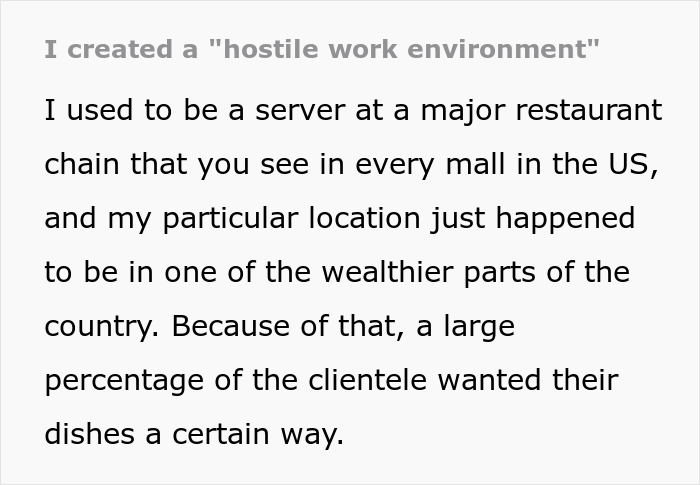

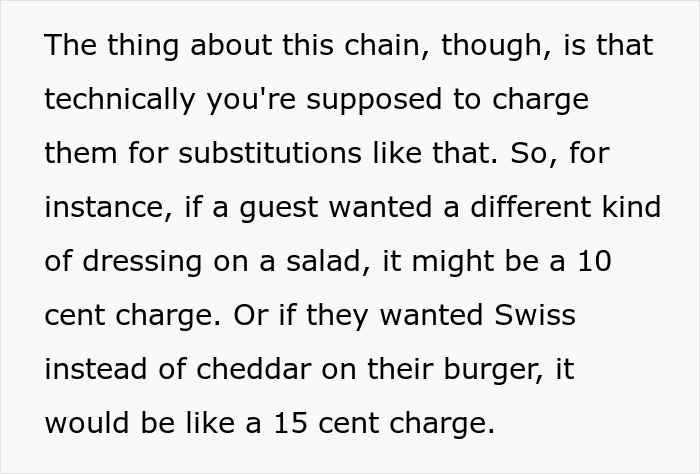
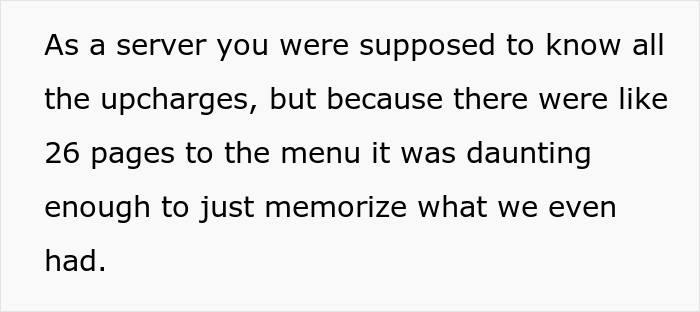

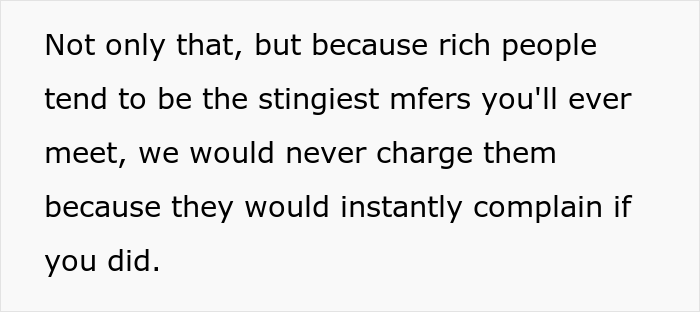
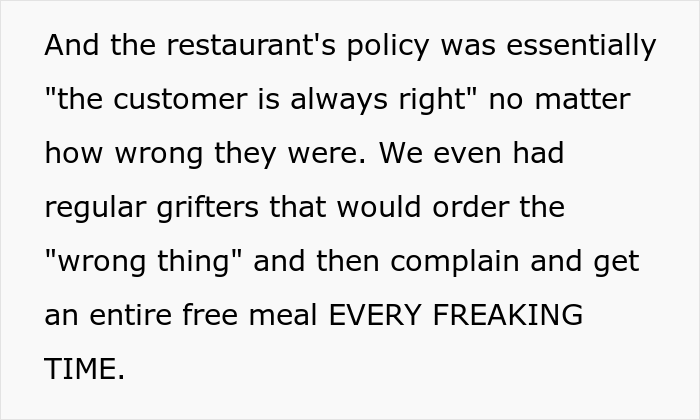
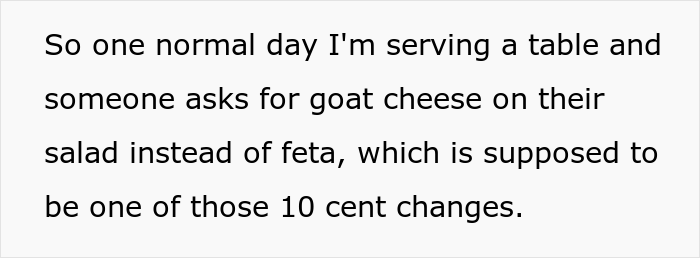
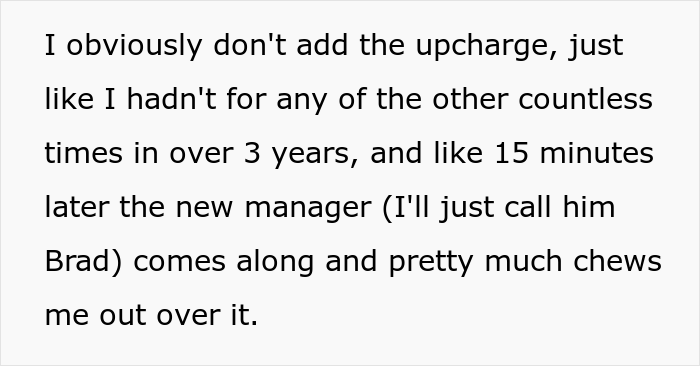

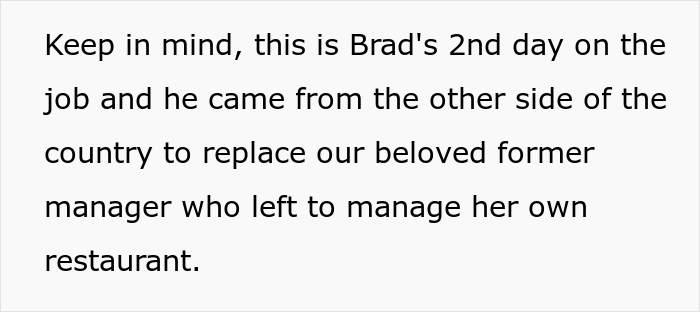
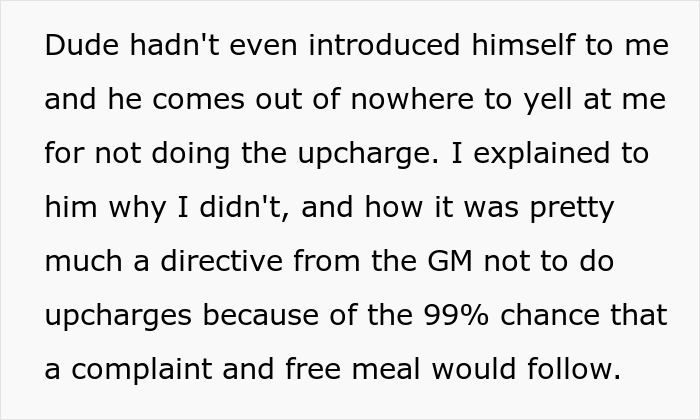

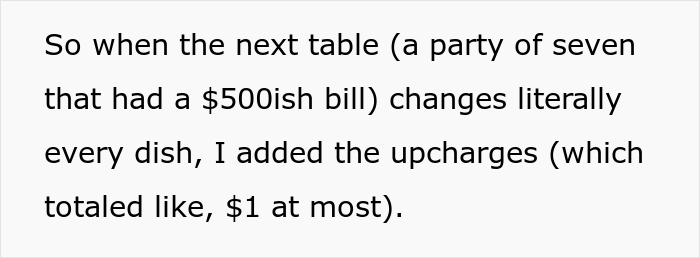
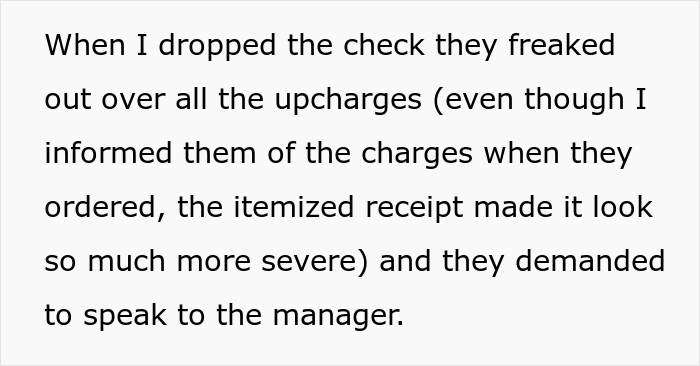
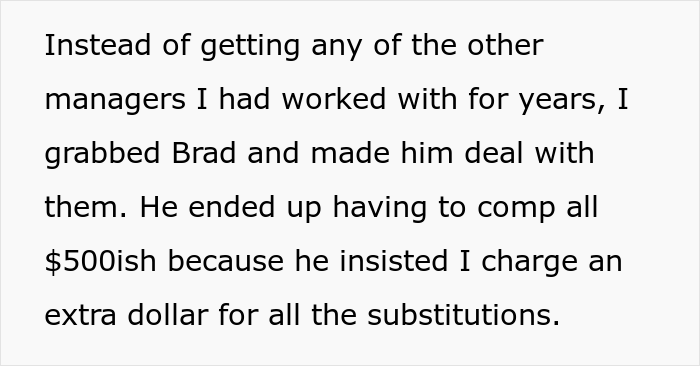

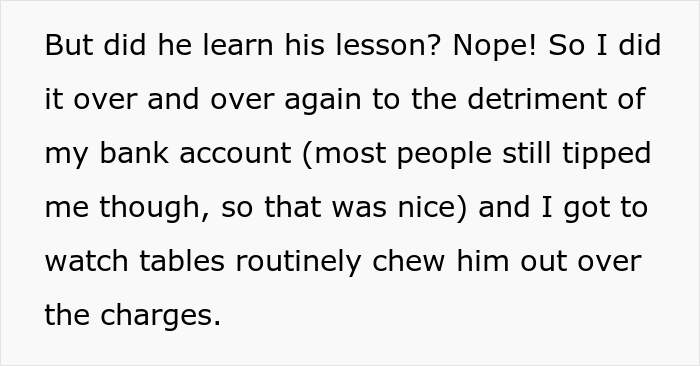
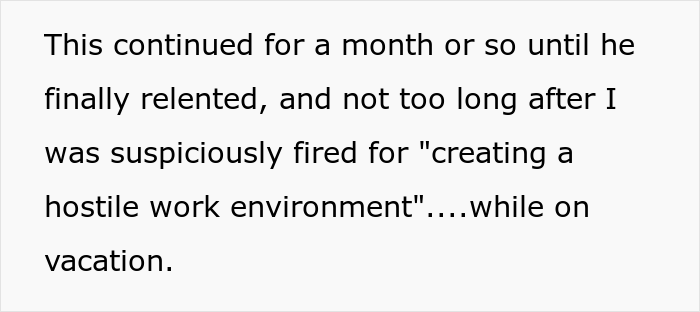
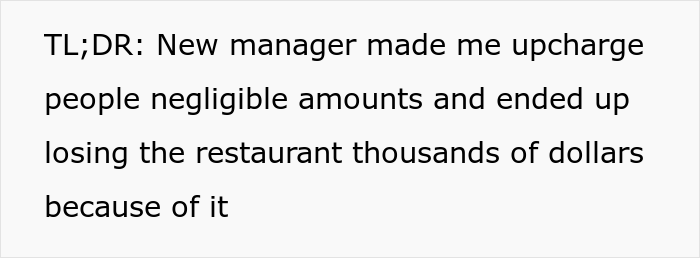
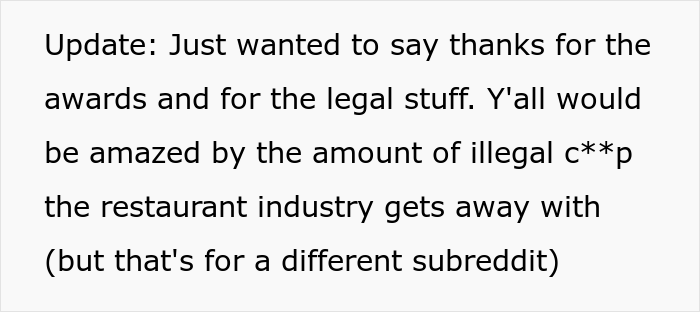


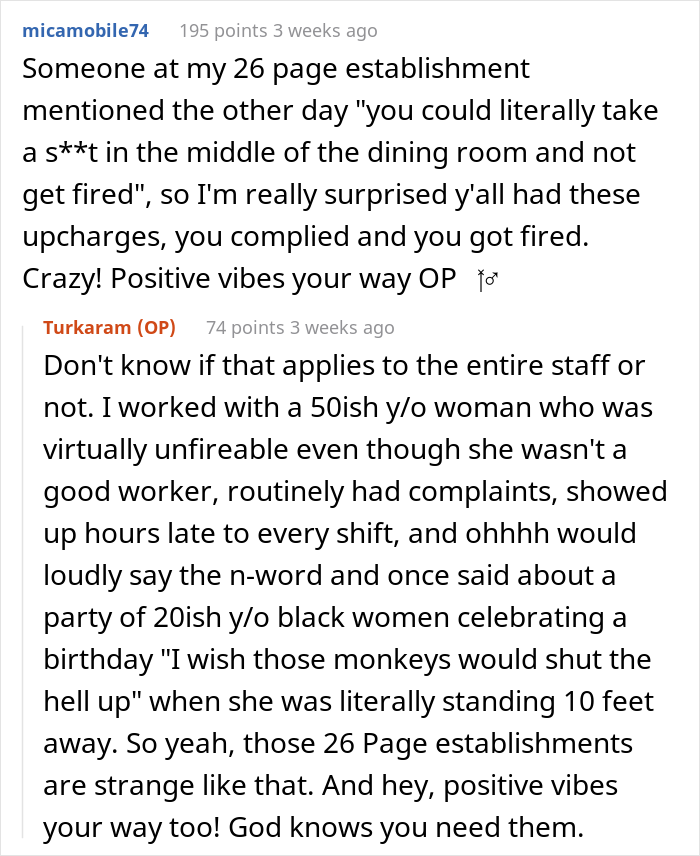




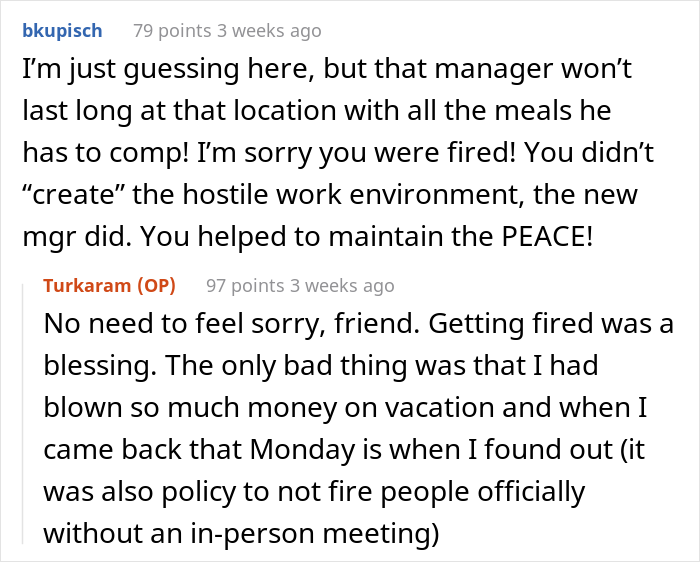

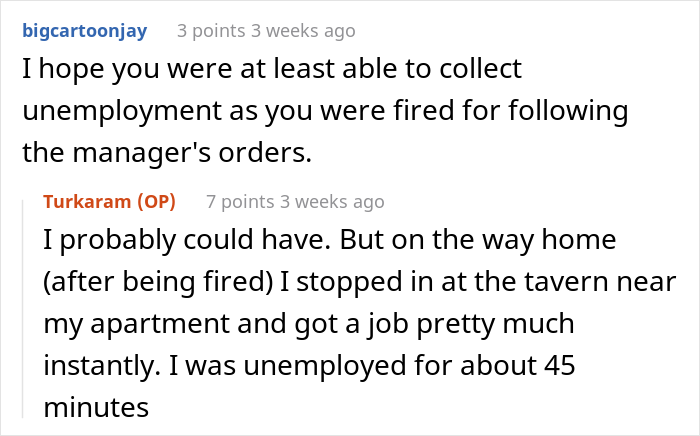
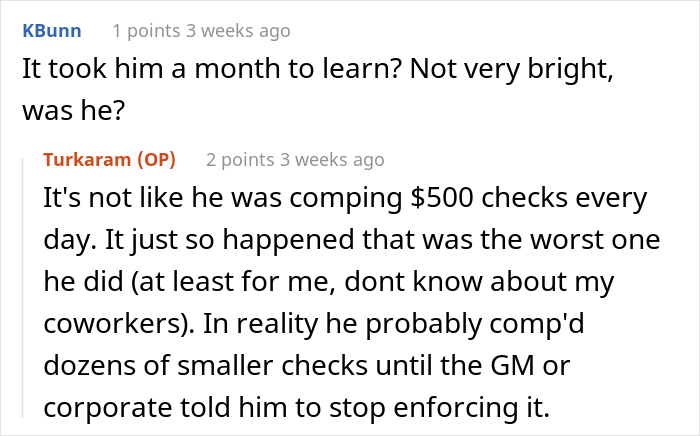










82
22